定语从句非谓语动词汉译英
- 格式:doc
- 大小:27.50 KB
- 文档页数:3

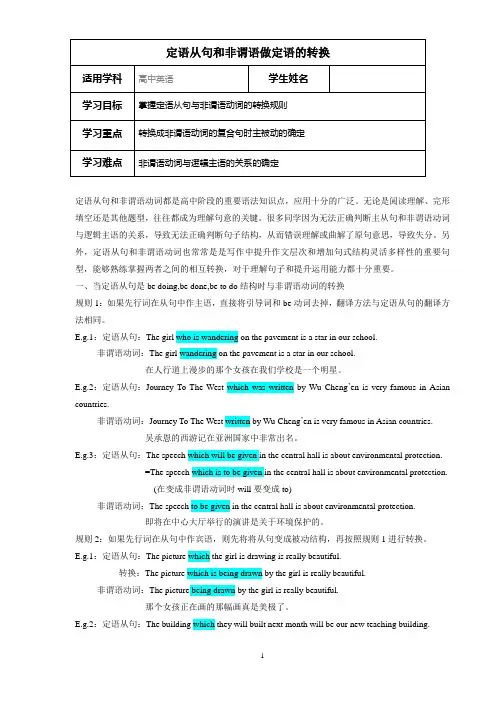
定语从句和非谓语动词都是高中阶段的重要语法知识点,应用十分的广泛。
无论是阅读理解、完形填空还是其他题型,往往都成为理解句意的关键。
很多同学因为无法正确判断主从句和非谓语动词与逻辑主语的关系,导致无法正确判断句子结构,从而错误理解或曲解了原句意思,导致失分。
另外,定语从句和非谓语动词也常常是是写作中提升作文层次和增加句式结构灵活多样性的重要句型,能够熟练掌握两者之间的相互转换,对于理解句子和提升运用能力都十分重要。
一、当定语从句是be doing,be done,be to do结构时与非谓语动词的转换规则1:如果先行词在从句中作主语,直接将引导词和be动词去掉,翻译方法与定语从句的翻译方法相同。
E.g.1:定语从句:The girl who is wandering on the pavement is a star in our school.非谓语动词:The girl wandering on the pavement is a star in our school.在人行道上漫步的那个女孩在我们学校是一个明星。
E.g.2:定语从句:Journey To The West which was written by Wu Cheng’en is very famous in Asian countries.非谓语动词:Journey To The West written by Wu Cheng’en is very famous in Asian countries.吴承恩的西游记在亚洲国家中非常出名。
E.g.3:定语从句:The speech which will be given in the central hall is about environmental protection.=The speech which is to be given in the central hall is about environmental protection.(在变成非谓语动词时will要变成to)非谓语动词:The speech to be given in the central hall is about environmental protection.即将在中心大厅举行的演讲是关于环境保护的。

定语从句和非谓语从句嘿,大家好,今天咱们聊聊英语里那些“定语从句”和“非谓语从句”。
这听上去可能有点枯燥,但其实没那么复杂,咱们把它变得有趣一点,让你听了都想笑。
先说说定语从句吧,它其实就是用来修饰名词的,像是给名词穿上漂亮的衣服。
想象一下,你走在街上,看到一个穿着花衬衫、带着墨镜的人,你可能会想:“哇,这人真酷!”在英语里,你可以用一个定语从句来描述他,比如“the guy who is wearing a floral shirt.” 嗯,听上去是不是很酷?其实你就是在用一个从句给这个人加了一点儿特别的气质。
再说说非谓语从句,这个东西其实就像是个超级英雄,它可以让你省略一些动词,让句子变得更加简洁。
比如说,你可以说“to go to the store,” 这就是一个不带时态的短语。
你说的对,就是不带时态的!想象一下,你早上起来,觉得咖啡很重要,嘴里叼着牙刷,心里想着“我得去买咖啡。
”这时候你可以说“Going to buy coffee.” 一下子就把复杂的句子变成了简单的短语,超级方便是不是?这就像是你在厨房做菜,不想洗太多的锅,直接用一个锅搞定一切,省时又省力。
你可能在想,这些东西跟咱们的日常生活有什么关系。
它们就像调味料,给我们的语言增添了风味。
想象一下,你在聚会上,跟朋友们聊天,突然来了个超精彩的故事,像是“那个昨天晚上跳舞的姑娘,她真会跳。
”用定语从句,让你的故事更生动。
有了这些从句,你的故事就会变得丰富多彩,朋友们都会被你吸引,听得津津有味。
咱们说到这些句子,语法是不可避免的,但谁说语法不能玩得开心呢?想象一下,夏天的傍晚,微风拂面,和朋友们围坐在一起,分享彼此的故事。
这时候你说:“我遇见了一个正在读书的男孩,他的眼睛像星星一样亮。
”这就是定语从句在发挥魔力,让你的话变得更加生动。
大家都在想:“哇,那个男孩一定很帅!”所以,语法其实是一种魅力的表达。
好吧,接下来我再来点幽默的。
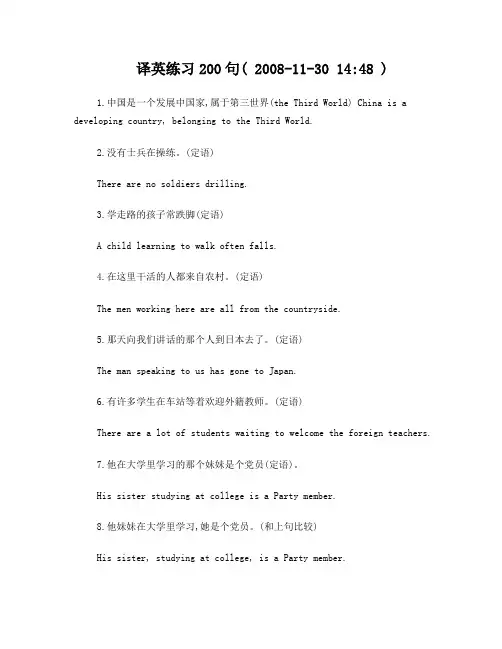
译英练习200句( 2008-11-30 14:48 )1.中国是一个发展中国家,属于第三世界(the Third World) China is a developing country, belonging to the Third World.2.没有士兵在操练。
(定语)There are no soldiers drilling.3.学走路的孩子常跌脚(定语)A child learning to walk often falls.4.在这里干活的人都来自农村。
(定语)The men working here are all from the countryside.5.那天向我们讲话的那个人到日本去了。
(定语)The man speaking to us has gone to Japan.6.有许多学生在车站等着欢迎外籍教师。
(定语)There are a lot of students waiting to welcome the foreign teachers.7.他在大学里学习的那个妹妹是个党员(定语)。
His sister studying at college is a Party member.8.他妹妹在大学里学习,她是个党员。
(和上句比较)His sister, studying at college, is a Party member.9.我昨天在河边遇到了麦克,他在钓鱼。
(定语)Yesterday at the riverside I met Mike , fishing.10 .史密斯先生昨天作的报告非常有趣(定语)The lecture given by Mr. Smith was very interesting.10.这些实习生(trainees)制造的机器运转良好。
(定语) The machines made by the trainees work very well.11.她给儿子的礼物是本字典。
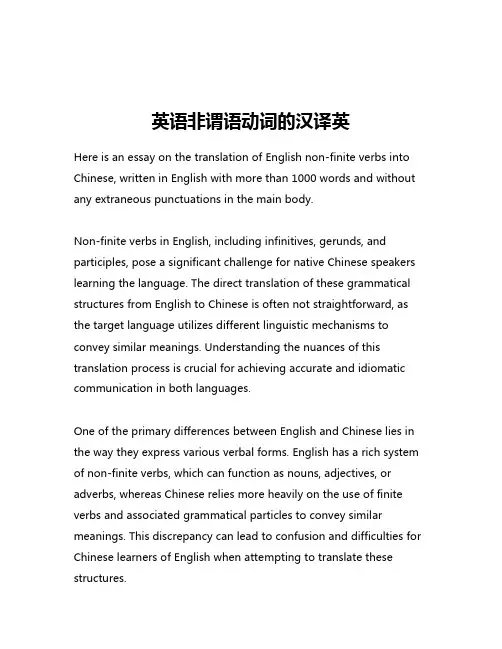
英语非谓语动词的汉译英Here is an essay on the translation of English non-finite verbs into Chinese, written in English with more than 1000 words and without any extraneous punctuations in the main body.Non-finite verbs in English, including infinitives, gerunds, and participles, pose a significant challenge for native Chinese speakers learning the language. The direct translation of these grammatical structures from English to Chinese is often not straightforward, as the target language utilizes different linguistic mechanisms to convey similar meanings. Understanding the nuances of this translation process is crucial for achieving accurate and idiomatic communication in both languages.One of the primary differences between English and Chinese lies in the way they express various verbal forms. English has a rich system of non-finite verbs, which can function as nouns, adjectives, or adverbs, whereas Chinese relies more heavily on the use of finite verbs and associated grammatical particles to convey similar meanings. This discrepancy can lead to confusion and difficulties for Chinese learners of English when attempting to translate these structures.The English infinitive, for instance, is often rendered in Chinese through the use of the modal verb 要(yào) or the preposition 去(qù). For example, the sentence "I want to go to the park" can be translated as "我要去公园" (Wǒ yào qù gōngyuán), where the infinitive "to go" is expressed through the modal verb 要(yào). Similarly, the phrase "I like to read books" can be rendered as "我喜欢去读书" (Wǒ xǐhuān qù dúshū), where the infinitive "to read" is conveyed using the preposition 去(qù).Gerunds, on the other hand, can be a more challenging aspect of translation, as Chinese does not have a direct equivalent grammatical structure. In such cases, Chinese often relies on nominalizing the verb through the use of the particle 的 (de) or the noun 事(shì). For instance, the English sentence "I enjoy swimming" can be translated as "我喜欢游泳的" (Wǒ xǐhuān yóuyǒng de) or "我喜欢游泳这件事" (Wǒ xǐhuān yóuyǒng zhè jiàn shì), where the gerund "swimming" is rendered as a nominalized verb.Participles, which can function as adjectives in English, also require careful consideration when translating into Chinese. In many cases, Chinese utilizes a relative clause structure or a verb-object construction to convey the meaning of a participle. For example, the sentence "The sleeping child is adorable" can be translated as "正在睡觉的孩子很可爱" (Zhèngzài shuìjiào de háizi hěn kěài), where thepresent participle "sleeping" is expressed through the relative clause "正在睡觉的" (zhèngzài shuìjiào de).Additionally, the translation of non-finite verbs can be further complicated by the context-dependent nature of their usage in both languages. Certain idiomatic expressions or colloquial phrases may require more nuanced approaches to ensure accurate and natural-sounding translations. For instance, the English phrase "I can't help but laugh" may be rendered in Chinese as "我忍不住笑了" (Wǒ rěn bù zhù xiào le), where the infinitive "to laugh" is expressed through the verb-object construction "忍不住笑" (rěn bù zhù xiào).Mastering the translation of non-finite verbs between English and Chinese is a crucial aspect of achieving proficiency in both languages. It requires a deep understanding of the grammatical structures, idiomatic expressions, and cultural nuances that shape the way these verbal forms are used and conveyed. By developing a comprehensive knowledge of these translation principles, learners can enhance their ability to communicate effectively and accurately in cross-linguistic contexts, ultimately facilitating meaningful and successful intercultural exchanges.。


英译汉非谓语动词的译法一、英译汉非谓语动词的译法英语中非谓语动词包括分词、不定式和动名词。
动名词与名词具有类似的功能,在翻译时可以参考名词性从句或抽象名词的译法, 下面, 我们主要通过一些实例说明动词不定式和分词的翻译方法。
例1.Americans do not like to be called materialistic because they feel that this unfairly accuses them of loving only material things and of having no religious values.美国人不喜欢被称为物质主义者, 因为他们认为指控他们只重物质利益, 没有宗教价值观是不公正的。
(不定式作宾语)例2.The writer's purpose may be simply to inform, or to make readers aware of similarities or differences that interesting and significant in themselves. 作者的目的或许只是想告诉读者或者让读者意识到(存在于比较对象之间的)很有趣、值得注意的相似和不同之处。
(不定式作表语)例3.The aim of science is to describe the world in orderly language, in such a way that we can, if possible, foresee the results of those alternative courses of action between which we are always choosing.科学的目的在于用规律的语言来描述世界。
这样, 如果可能的话, 我们就能预见到可供选择的两个行动方案的结果。
我们经常遇到这种选择。
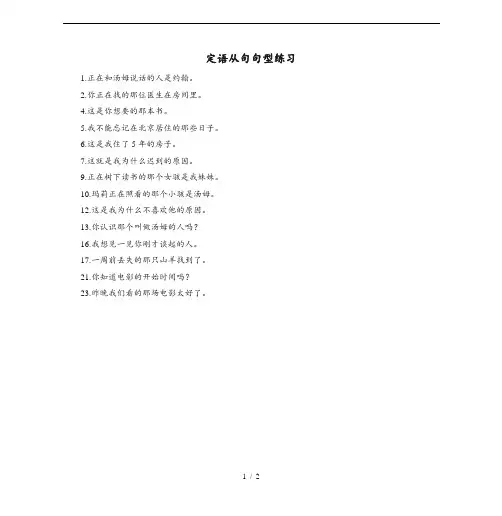
定语从句句型练习1.正在和汤姆说话的人是约翰。
2.你正在找的那位医生在房间里。
4.这是你想要的那本书。
5.我不能忘记在北京居住的那些日子。
6.这是我住了5年的房子。
7.这就是我为什么迟到的原因。
9.正在树下读书的那个女骇是我妹妹。
10.玛莉正在照看的那个小骇是汤姆。
12.这是我为什么不喜欢他的原因。
13.你认识那个叫做汤姆的人吗?16.我想见一见你刚才谈起的人。
17.一周前丢失的那只山羊找到了。
21.你知道电影的开始时间吗?23.昨晚我们看的那场电影太好了。
1.The boy who is talking with Tom is John.2.The doctor whom you are looking for is in the room .4.This is the book which you want .5.I can’t forget the days when I lived in Beijing .6.This is the house where I lived for five years .7.This is (the rea son) why I’m late .9.The girl who is reading under the tree is my sister .10.The boy whom Mary is looking after is Tom .12.This is (the reason) why I don’t like him .13.Do you know the man whose name is Tom .16.I want to see the man whom you talked of just now .17.The goat which was lost a week ago has been found .20.This is the only thing that we can do .21.Do you know the time when the film will begin ?23.The film which we saw yesterday evening was wonderful .。

英译汉非谓语动词的译法一、英译汉非谓语动词的译法英语中非谓语动词包括分词、不定式和动名词。
动名词与名词具有类似的功能,在翻译时可以参考名词性从句或抽象名词的译法, 下面, 我们主要通过一些实例说明动词不定式和分词的翻译方法。
例1.Americans do not like to be called materialistic because they feel that this unfairly accuses them of loving only material things and of having no religious values.美国人不喜欢被称为物质主义者, 因为他们认为指控他们只重物质利益, 没有宗教价值观是不公正的。
(不定式作宾语)例2.The writer's purpose may be simply to inform, or to make readers aware of similarities or differences that interesting and significant in themselves. 作者的目的或许只是想告诉读者或者让读者意识到(存在于比较对象之间的)很有趣、值得注意的相似和不同之处。
(不定式作表语)例3.The aim of science is to describe the world in orderly language, in such a way that we can, if possible, foresee the results of those alternative courses of action between which we are always choosing.科学的目的在于用规律的语言来描述世界。
这样, 如果可能的话, 我们就能预见到可供选择的两个行动方案的结果。
我们经常遇到这种选择。
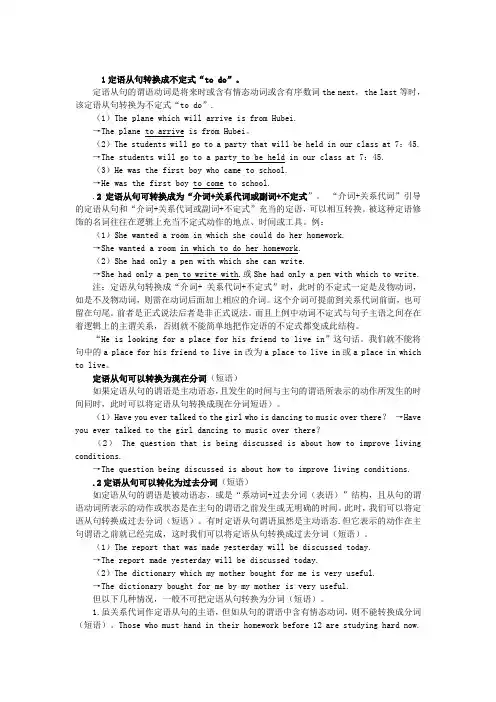
1定语从句转换成不定式“to do”。
定语从句的谓语动词是将来时或含有情态动词或含有序数词the next, the last等时,该定语从句转换为不定式“to do”.(1)The plane which will arrive is from Hubei.→The plane to arrive is from Hubei。
(2)The students will go to a party that will be held in our class at 7:45.→The students will go to a party to be held in our class at 7:45.(3)He was the first boy who came to school.→He was the first boy to come to school..2定语从句可转换成为“介词+关系代词或副词+不定式”。
“介词+关系代词”引导的定语从句和“介词+关系代词或副词+不定式”充当的定语,可以相互转换。
被这种定语修饰的名词往往在逻辑上充当不定式动作的地点、时间或工具。
例:(1)She wanted a room in which she could do her homework.→She wanted a room in which to do her homework.(2)She had only a pen with which she can write.→She had only a pen to write with.或She had only a pen with which to write.注:定语从句转换成“介词+ 关系代词+不定式”时,此时的不定式一定是及物动词,如是不及物动词,则需在动词后面加上相应的介词。
这个介词可提前到关系代词前面,也可留在句尾。
前者是正式说法后者是非正式说法。
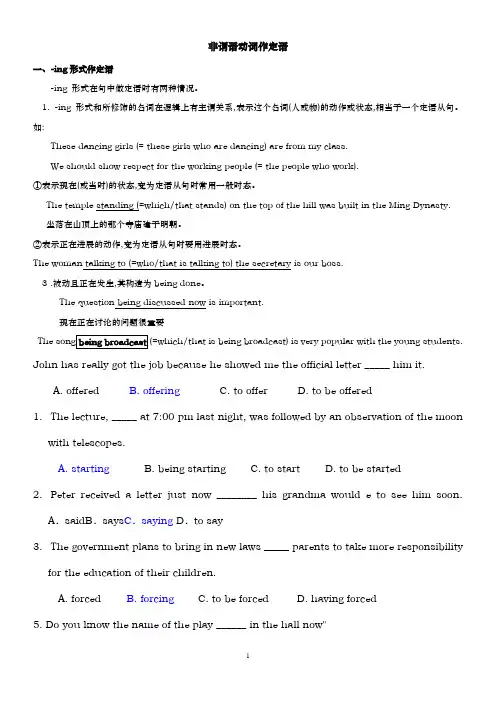
非谓语动词作定语一、-ing形式作定语-ing 形式在句中做定语时有两种情况。
1. -ing 形式和所修饰的名词在逻辑上有主谓关系,表示这个名词(人或物)的动作或状态,相当于一个定语从句。
如:These dancing girls (= these girls who are dancing) are from my class.We should show respect for the working people (= the people who work).①表示现在(或当时)的状态,变为定语从句时常用一般时态。
The temple standing (=which/that stands) on the top of the hill was built in the Ming Dynasty.坐落在山顶上的那个寺庙建于明朝。
②表示正在进展的动作,变为定语从句时要用进展时态。
The woman talking to (=who/that is talking to) the secretary is our boss.3 .被动且正在发生,其构造为being done。
The question being discussed now is important.现在正在讨论的问题很重要John has really got the job because he showed me the official letter _____ him it.A. offeredB. offeringC. to offerD. to be offered1.The lecture, _____ at 7:00 pm last night, was followed by an observation of the moonwith telescopes.A. startingB. being startingC. to startD. to be started2.Peter received a letter just now ________ his grandma would e to see him soon.A.saidB.says C.saying D.to say3.The government plans to bring in new laws _____ parents to take more responsibilityfor the education of their children.A. forcedB. forcingC. to be forcedD. having forced5. Do you know the name of the play ______ in the hall now"A. to be put onB. being put onC. put onD. putting on二、过去分词作定语1.过去分词所表示的动作在谓语动词所表示的动作之前发生,并且表被动。
定语从句与非谓语的转换定语从句与非谓语转换的经典例子Replace the underlined part with ing/ ed / to do1. The computer centerwhich was openedlast year, is very popular among thestudents. in the school.转换为The computer centeropenedlast year, is very popular among the students. in the school.2. Most of the artistswho were invited tothe party were from South Africa.转换为Most of the artistsinvited tothe party were from South Africa.3. There was a terrible noisewhich followed the sudden burst of light.转换为There was a terrible noisefollowing the sudden burst of light.4. Do you know the boywho is lying under the big tree转换为Do you know the boylying under the big tree5. Are you going to attend the meetingwhich will be heldtomorrow转换为Are you going to attend the meetingto be heldtomorrow6. I like most of the bookswhich are publishedin this publishing house.转换为I like most of the bookspublishedin this publishing house.7. This is one of the questionswhich are being discussedat the meeting now. 转换为This is one of the questionsbeing discussedat the meeting now.8. Would you please give me a piece of paperwhich I can write on转换为Would you please give me a piece of paperto write on9.The next trainwhich will arriveis from Washington.转换为The next trainarrivingis from Washington.分词作前置定语We can see the rising sun.正在升起的太阳Look at the sleeping baby. So cute.Watch out that a moving lorry移动的卡车Don’t eat too many like fried chicken legsHe is a retired worker.退休的工人主动的情况I know a man who works in that factory.I know a man working in that factory.I know a man who is working in that factory.I know a man working in that factory.I know a man who worked in that factory.I know a man working in that factory.The girl who sits beside me is my cousin.The girl sitting beside me is (was) my cousinThe girl who is sitting beside me is my cousin.The girl sitting beside me is (was) my cousinThe girl who sat beside me was my cousin.The girl sitting beside me is (was) my cousin.结论先行词与现在分词有主动关系,定语从句转换成现在分词短语做后置定语,有主动或进行的意思。
定语从句和非谓语形式的相互转换逻辑关系1. The man who is sitting on the platform is a professor from Wuhan University.2. The letter that was mailed last night will reach him tomorrow.3. You are welcome to a party to be given in our class at 7:45.说明:以上的定语从句部分可以用更加简单的非谓语形式表达出来:1. The man sitting on the platform is a professor from Wuhan University.2. The letter mailed last night will reach him tomorrow.3. You are welcome to a party to be given in our class at 7:45.说明:修饰一个名词除了后面用定语从句以外,还可以用非谓语动词形式:doing短语,done短语,being done短语,to be done 短语修饰。
其结构和意思如下:1. 被修饰名词+doing短语:正在做….的人/正在发生的事。
2. 被修饰名词+ done短语:被…..的人/事3. 被修饰名词+being done短语:正在被…..的人/事4. 被修饰名词+ to be done短语:将要被…..的人/事总结:以上做定语的那些短语就是英语语法中所说的分词,不定式的各种形式作定语。
1. 这些短语作定语应放在被修饰名词的后面。
如果单独一个V-ing或V-ed形式作定语,则可以放在被修饰名词前面。
2. 分词作定语时,其动作应与全句动作同时发生。
V-ing表示主动意义和正在做,V-ed表示被动意义。
being done表示正在被做的3. 不定式作定语表示将要发生的,to be done表示将要被做的。
定语从句汉译英范文定语从句汉译英练习(附答案)1、她就是那个努力学习数学的女孩。
She is the girl who studies math hard.2、他就是我们刚才谈论的那个人。
He is the man whom/that we talked about just now.3、这就是那个爸爸是警察的女孩。
This is the girl whose father is a policeman.4、他们住在一座窗户朝南的房子里。
They live in a house whose windows face south.5、我仍然记得我第一次来到这座城市的那一天I still remember the day when we first arrived in the city.6、这就是我们以前住过的房子This is the house in which/where we used to live.7、他们来到一所农舍,农舍前面坐着一个小男孩They arrived at a cottage, in front of which sat a little boy.8、我花10元钱买的钢笔丢了I lost the pen that cost me 10 yuan.9、那个女人住在楼下,她是个音乐家The woman lives downstairs, who is a musician.10、他考试通过了,这使他父母很高兴He passed the exam, which made his parents happy.11.、众所周知,中国将在xx年举办奥运会As we all know, china host the olympic games in xx. china host the olympic games in xx, which we all know.12、我永远记得我参军的那一天I will always remember the day when I joined the army.13、我们班有50个学生,三分之二是女生There are 50 students in our class, 2/3 of whom are girls.14、我们期望的那一天将很快来到The day (that/which we expect) will e soon.15、他们正在谈论在公园里看到的人和物They are talking about the people and things that they saw in the park.16、这是30年代写的最著名的剧本之一This is the one of the most famous scripts that was written in the 30s.17.这正是我要为她买的礼物This is the very present that I want to buy for her.18、正在看电视的女孩是Kate.The girl who is watching TV is Kate.19、她就是照顾这些孩子的护士.She is the nurse that took care of these children.20、我遇见了告诉我这个消息的史密斯先生.I met Mr. Smith, who told me the news.21、你认识我们在学校里遇见的老师吗?考试及答案Do you know the teacher whom we met in the school?22、她就是我们正在寻找的人.She is the person we are looking for.23、书包丢了的那个男孩叫Tom.The boy is Tom who lost his bag.The boy is tom whose bag was missing.24、被叫到名字的男孩们站起来.The boys whose names are called stand up please.25、这就是你要的那本书。
定语从句与非谓语的转换定语从句与非谓语转换的经典例子Repl ace the un derl ined part with ing/ ed / to do1. The computer center which was opened last year, is very popular among the stude nts. in theschool.转换为The computer center opened last year, is very popular amongthe stude nts. in the school.2.Most of the artists who were invited to the party were from South Africa.转换为Most of the artists invited to the party were from SouthAfrica.3.There was a terrible noise which followed the sudden burst of light.转换为There was a terrible noise following the sudden burst of light.4.Do you know the boy who is lyingunde^hebg tree?转换为Do you know the boy lying under the big tree?转换为Are you going to attend the meeting to be held tomorrow?5. Are you going to atte nd the meeti ng which will be held tomorrow?6.I like most of the books which are published in this publishing house.转换为I like most of the books published in this publishing house.7.This is one of the questi ons which are being discussed at the meet ing now.转换为This is one of the questions being discussed at the meeting now.8.Would you pl ease give me a pi ece of paper which I can write on ?转换为Would you please give me a piece of paper to write on ?9. The n ext train which will arrive is fromWash ington.转换为The next train arriving is from Washington.分词作前置定语We can see the rising sun. 正在升起的太阳Look at the slee ping baby. So cute.Watch out that a moving lorry Don t eat too many like fried chicken legsI know a man who works in that factory. I know a man worki ng in that factory. I know a man who is worki ng in that factory. I know a man worki ng in that factory. I know a man who worked in that factory. I know a man worki ng in that factory. The girl who sits beside me is my cous in. The girl sitti ng beside me is (was) my cous in The girl who is sitti ng beside me is my cous in. The girl sitt ing beside me is (was) my cous in The girl who sat beside me was my cous in. The girl sitti ng beside me is (was) my cous in移动的卡车He is a retired worker. 退休的工人主动的情况结论先行词与现在分词有主动关系,定语从句转换成现在分词短语做后置定语,有主动或进行的意思。
初中英语知识点归纳定语从句中的非谓语动词定语从句是英语中常见的句子结构,它可以用来修饰前面的名词或代词,并进一步描述这个名词或代词。
在定语从句中,非谓语动词也扮演着重要的角色,起到补充说明的作用。
在本文中,我们将归纳总结初中英语中定语从句中的非谓语动词的用法。
一、带有非谓语动词的定语从句在定语从句中,非谓语动词主要有不定式、动名词和过去分词这三种形式。
它们可以替代定语从句中的谓语动词,起到修饰名词或代词的作用。
下面分别介绍三种非谓语动词的具体用法。
1. 不定式不定式作为非谓语动词在定语从句中的用法多种多样,主要包括以下几种情况:1)作定语例如:- I have a lot of books to read.(我有很多要看的书。
)- He has many friends to help him.(他有许多朋友来帮助他。
)2)作后置定语例如:- They have a lot of things to do.(他们有很多事情要做。
)- She has a lot of songs to sing.(她有很多歌要唱。
)3)作状语例如:- He studies hard to learn English well.(他努力学习英语。
)- She runs every morning to keep fit.(她每天早上跑步保持健康。
)2. 动名词在定语从句中,动名词作为非谓语动词有以下几种常见的用法: 1)作定语例如:- I have a plan of going abroad.(我有一个出国的计划。
)- He told me a story about helping others.(他给我讲了一个关于帮助他人的故事。
)2)作后置定语例如:- There is no way of solving the problem.(没有解决这个问题的办法。
)- The key to passing the exam is hard work.(通过考试的关键是努力学习。
1. 非谓语动词:谓语(notional verb 实义动词)+非谓语(non-predicate:v-ing;verb-to do; verb-to do:1、非谓语动词和动词的共同点、区别、句子中的作用、独立主格从动词当中衍生出来:具有很多动词的特征,但不能做谓语:可以做除谓语之外的其他任何成分:主语,宾语,表语(predicative),定语(attributive),状语(adverbial modifier)补语(complement)2.作定语和做状语的区别:为什么会出现非谓语动词呢:中文一个句子可以有n个动词,但是英文一个句子只能有一个谓语,就需要把其他动词用非谓语呈现出来动词:时态、语态、非谓语,虚拟语气做状语:Having taken my temperature, my mother found I was ill.Being ill, I can’t go to school tomorrow.Not having finished his lessons, he won’t go out to playI went up to him, telling him to keep silent.Interrupted by the man, he became angry.To prevent the wild animals from extinction, we took some measures.独立主格结构:We being League members, the work was well done.(逻辑主语不一致)There being no bus, we had to walk home.Many trees, flowers, and grass to be planted, our newly-bulit school will look even more beautiful.都有被修饰的名词:The man standing by the window is my brother.The letter written by my classmate is very interesting.Without mothering, children’s capacity to survive is seriously affected.The man speaking to us has gone to Japan.There are a lot of students waiting to welcome the foreign teachers.To do作主语:To finish the work in ten minutes is very hard.To loose your confidence means failure.避免头重脚轻,it 作形式主语:it is hard to finish the task within ten minutes.做表语:her job is to clean the hall.// he appears to have caught a cold.做宾语:I decided to lose wight. Make up his mind to improve.做定语:meeting to attend; house to live in; nothing to worry about; place to live做状语:根据功能的不同;worked day and night to get money; sold her hair to buy some bread; (目的状语);前后主语要一致;to save money, he tries every means;(结果状语)三大从句:定语从句==形容词的功能(修饰名词、代词)状语从句===副词的功能(时间、地点、目的、方式、原因、结果、让步9大从句,表示状语不仅是用状语从句)名词性从句===名词的功能(主语、宾语、表语、同位语从句)定语从句:1. 什么叫做定从,修饰名词或代词的从句。
我们应该感谢那些曾经看不起我们的人。
我们在伦敦参观的第一个地方就是大本钟。
我十年前住的房子已经被推到了。
我需要一把能削苹果的刀子。
我正在街上寻找一个能过夜的地方。
这是一场对于任何一个真正喜欢西方流行音乐的人都不应该错过的演出会。
他们把五十年前埋在地下的时间胶囊取出。
长城是地球上唯一一个能从月球上看到的建筑物。
你能告诉我他工作的办公室么?
你知道他缺席的原因吗?
她昨天去参加了个party ,在party上她遇到了他的Mr. Right。
只是我们能想到的节约用水的最好的办法。
他有两个儿子,他们在同一家公司上班。
我们班上有40个学生,他们中的大多数来自大城市。
篮子里有些苹果,它们中的一些已经烂了。
我们一起度过的那些日子是我一生中最快乐的时光
爱是一个奇迹,会让人不能呼吸。
我最爱的人伤我最深。
这部小说很感人,我已经读了三遍了。
史密斯先生上个月退休了,他曾经是我的老师。
他今天居然没有迟到,这使大家感到很意外。
我遇见他的公园就在马路对面。
长大后我们就会理解我们小时候不懂的东西。
他们分手的那天正飘着雪。
勇于做一个有梦想的人。
心里有座坟,葬着未亡人。
让一个人变强大的最好方式,就是拥有一个想要保护的人。
他突然辞职了,留下了很多工作未做
他们不在乎被人当作宾客对待
没有被邀请出席聚会,彼得很生气。
我下车的时候注意到一个男人从银行里跑出来。
我看见他走进房间,坐了下来,点燃了一根香烟。
她非常生气,把玩具扔在地上,摔成了碎片。
(= ... and broke it into pieces...)她捧着许多书走进了房间
他们住在一所朝南的房子里
看到那些画,她想起了自己的童年。
由于在农村出生并长大,他对在大城市里看到的一切新鲜事物都感到好奇。
昨天我在商店里注意到一个小女孩偷东西被抓住了。
我们发现所有的河流都被严重污染了。
我记得上星期给他发过一份电子邮件
他建议下个星期天带我女儿去动物园
学习对现代生活很重要
.游泳是她最喜欢的体育运动
他们有说有笑地走出教室。
她聚精会神地倾听她邻居的讲话。
在这个城市生活了3年,她对这里已很熟悉。
错过了这么振奋人心的演讲,我真的很遗憾。
我们记得看过这部电影
正在讨论的问题对我们公司将来的发展有着深远影响。
我不堪久候
在被带去看了实验室之后,我们又被带去参观校图书馆。
他没来使在场的每个人都很失望。
我很抱歉没能按时赴会
不知道他的地址,我只好在家里等着。
集邮很有趣
学习有关语言的知识比使用语言容易
制定计划很容易,实行它却很难
争论这事是浪费时间
和他谈话是没有用
给他打电话没用。
他不愿意来
努力一下是值得的。
这种事开不得玩笑。
她的工作是尽量使报告厅保持干净
真正的问题是了解学生的需要。
.他的爱好是集邮。
看到了世界上其它地方找不到的动植物真是令人惊讶。
今晚你想待在家里吗?
吸这么多烟对你的身体不好
天冷时他们喜欢呆在室内
我建议用另一种方法做这件事。
他们不在乎被人当作宾客对待。
他们承认在大厅里抽过烟
我很后悔自己说过的话
他情不自禁地笑了起来。
我不能想像这个男孩对你说话这么没礼貌。
他们更喜欢在大连度暑假
他的大衣需要洗了。
你的作文需要修改。
昨天晚上什么事使你不能和我们在一起
我们喜欢他教英语的方式。
天天吃同样的东西我感到腻烦了。
没有被邀请出席聚会,彼得很生气。
是谁负责组织这次大会?
约翰已承认了打碎窗子
你必须习惯用冷水洗脸。
我盼望今年暑假见到你
他为全人类的利益献出了自己的一生。
然而,另有一些人强烈反对发展私人小汽车。
他妻子死后不久,这人就开始嗜酒。
我们听见孩子们在楼上叫喊
我下车的时候注意到一个男人从银行里跑出来。
我觉得我的心在猛烈地跳动
他看见一个女孩在上汽车
他看见一个女孩上车开走了
他们不应该不让我们知道他们下一步要做什么。
我不允许你在房间里跑来跑去
我们使火整夜燃烧着。